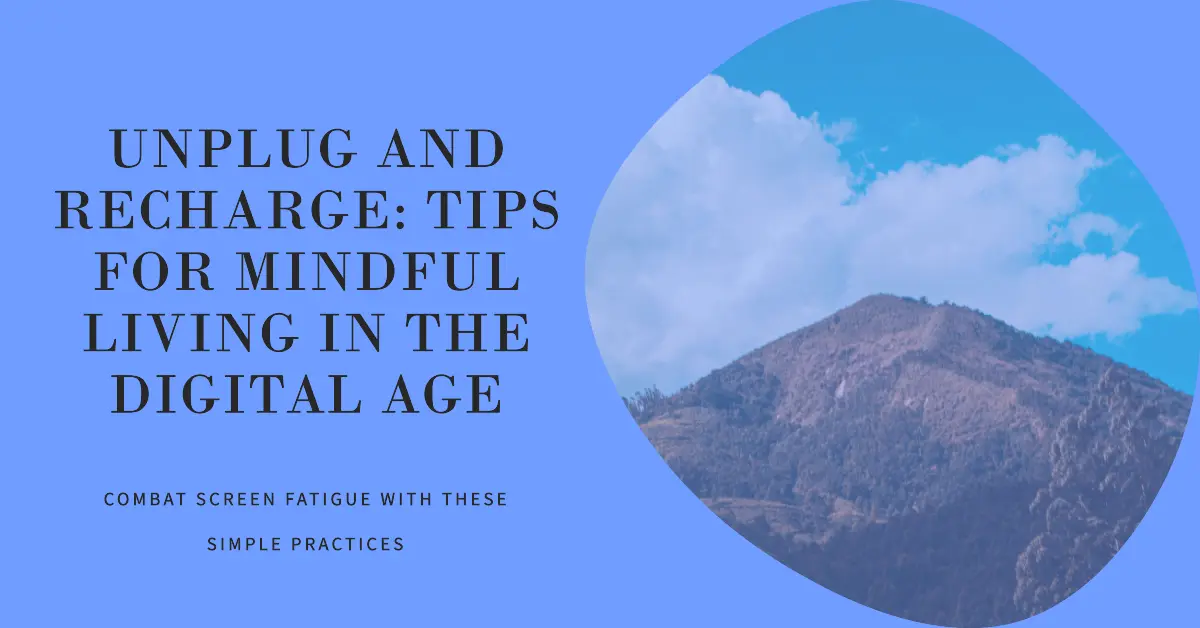In today’s fast-paced, digitally driven world, screen time is not just a part of life; it’s often a dominant feature. From the moment we wake up to the time we go to bed, our days are punctuated by digital interactions, whether it’s checking emails, scrolling through social media, or attending virtual meetings. While technology has undoubtedly made our lives more connected and convenient, it’s important to acknowledge a growing challenge: screen fatigue.
Understanding Screen Fatigue
Screen fatigue, or digital eye strain, refers to the physical discomfort felt after prolonged exposure to digital screens. Symptoms can include dry eyes, headaches, blurred vision, and neck and shoulder pain. Beyond physical symptoms, there’s a psychological aspect to consider. Excessive screen time can lead to feelings of anxiety, reduced attention span, and disrupted sleep patterns.
But here’s the good news: Mindfulness can be a powerful tool in combating screen fatigue. By incorporating mindfulness practices into your daily routine, you can mitigate the effects of screen time on both your physical and mental wellbeing.
Mindfulness Techniques to Combat Screen Fatigue
1. Regular Breaks and the 20-20-20 Rule:
Every 20 minutes, take a 20-second break to look at something 20 feet away. This simple practice helps reset your focus and gives your eyes a much-needed rest.
2. Mindful Breathing During Screen Time:
While working or browsing, take a moment to focus on your breath. Deep, conscious breathing reduces stress and helps maintain a calm, focused state of mind.
3. Setting Boundaries with Digital Devices:
Establish specific times when you disconnect from digital devices. Whether it’s during meals, an hour before bed, or designated ‘tech-free’ weekends, these breaks can be incredibly rejuvenating.
4. Mindfulness Meditation:
Regular mindfulness meditation can enhance your overall resilience to stress. Even a few minutes a day can make a significant difference in how you interact with technology and manage screen fatigue.
5. Physical Activity and Stretching:
Incorporate stretching or yoga into your routine, focusing on poses that relieve tension in the neck, shoulders, and back – areas often strained by screen use.
6. Mindful Use of Technology:
Be intentional with your screen time. Ask yourself if your digital activity is purposeful or just a habit. This awareness can lead to more meaningful and balanced use of technology.
The Benefits of Mindfulness in the Digital Age
Embracing mindfulness in our digital lives has far-reaching benefits. It not only helps in alleviating the immediate physical discomforts of screen fatigue but also enhances our mental health. Mindfulness practices cultivate a heightened state of awareness and presence, enabling us to recognize and break free from unhelpful patterns of digital overconsumption. This can lead to improved focus, better sleep, and a greater sense of balance and wellbeing in our lives.
FAQs on Mindfulness and Screen Fatigue
Can mindfulness techniques improve sleep disrupted by screen time?
Mindfulness practices, particularly when done before bed, can significantly improve sleep quality affected by excessive screen use.
How long does it take to see the benefits of mindfulness in combating screen fatigue?
The benefits of mindfulness can be noticed relatively quickly, often within a few weeks of consistent practice, though experiences can vary.
Are there specific mindfulness exercises for children struggling with screen fatigue?
Yes, there are child-friendly mindfulness exercises, such as simple breathing techniques and guided meditations, tailored to help children manage screen time.
Can mindfulness help in reducing the urge to constantly check digital devices?
Absolutely. Mindfulness enhances self-awareness, helping individuals recognize and curb compulsive behaviours related to device use.
Is it necessary to meditate to practice mindfulness for screen fatigue?
While meditation is a powerful tool, mindfulness can also be practiced through mindful breathing, conscious breaks, and other non-meditative techniques.
Taking the Next Step
At InnerSight Psychotherapy, we understand the challenges of finding balance in the digital age. Our team of skilled therapists can guide you through tailored mindfulness practices that suit your lifestyle and needs. Whether you’re dealing with screen fatigue or other stressors, we’re here to support your journey toward a healthier, more balanced life.
Remember, taking care of your mental health is crucial in today’s world. If you’re feeling overwhelmed by digital demands, don’t hesitate to reach out. Contact us at InnerSight Psychotherapy to book a consultation or learn more about how we can assist you.
Together, let’s navigate the complexities of the digital age with mindfulness and resilience.






